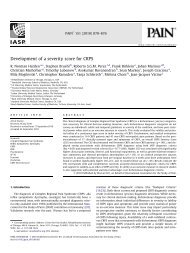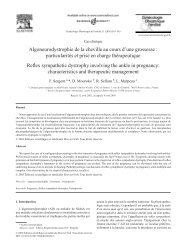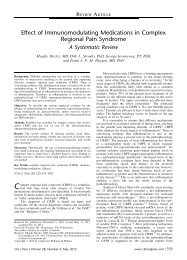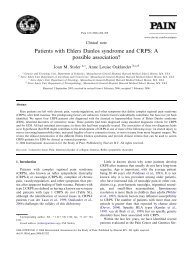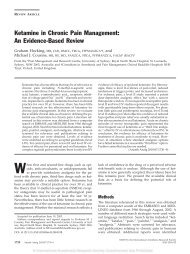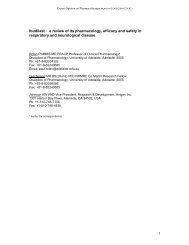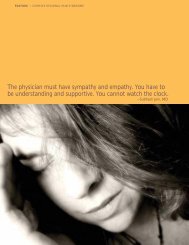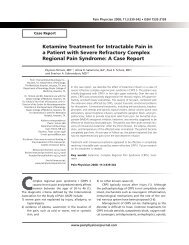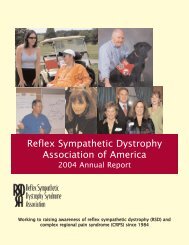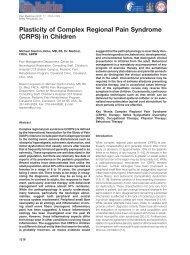thank you! - Reflex Sympathetic Dystrophy Association of America
thank you! - Reflex Sympathetic Dystrophy Association of America
thank you! - Reflex Sympathetic Dystrophy Association of America
Create successful ePaper yourself
Turn your PDF publications into a flip-book with our unique Google optimized e-Paper software.
call them “after thinkers.” After thinkers<br />
are clients who nod their heads up<br />
and down during client conferences only<br />
to telephone me later with a variety <strong>of</strong><br />
questions and concerns that could have<br />
been addressed during the conference. I<br />
suspect that a major cause <strong>of</strong> “after thinking”<br />
is awkwardness. Clients <strong>of</strong>ten feel<br />
uncomfortable challenging a lawyer’s<br />
opinions in real time. Unfortunately, delaying<br />
important questions or concerns<br />
tends to lead attorneys to conclude that<br />
there is consensus between<br />
lawyer and client, when<br />
in fact such is not the<br />
case. If <strong>you</strong> have concerns<br />
about any aspect <strong>of</strong> <strong>you</strong>r<br />
case–ask. If <strong>you</strong> do not understand<br />
the case plan <strong>you</strong>r<br />
lawyer has developed, ask<br />
for an explanation. If <strong>you</strong><br />
still do not understand the<br />
case plan, ask until <strong>you</strong> do<br />
understand it.<br />
Rule 5: Too many<br />
cooks spoil the soup—<br />
and the case.<br />
If <strong>you</strong> find <strong>you</strong>rself losing confidence in<br />
<strong>you</strong>r attorney, make an appointment to<br />
meet in person and address <strong>you</strong>r concerns<br />
face to face. Too <strong>of</strong>ten, dissatisfied clients<br />
tend to seek out the opinions <strong>of</strong> other lawyers,<br />
who have little or no familiarity with<br />
the particular facts and circumstances surrounding<br />
the client’s case. This results in<br />
greater confusion on the part <strong>of</strong> the client.<br />
Don’t expect a lawyer who has not had the<br />
benefit <strong>of</strong> working on <strong>you</strong>r case to have<br />
the answers. It’s unreasonable and selfdefeating.<br />
Instead, advise <strong>you</strong>r lawyer that<br />
<strong>you</strong> have concerns and insist on answers<br />
that help <strong>you</strong> to resolve them.<br />
A brief word about Workers’<br />
Compensation cases<br />
The two most common scenarios where<br />
people find themselves injured and subsequently<br />
seeking compensation involve<br />
injuries suffered at work and outside <strong>of</strong><br />
work. If an injury occurs during <strong>you</strong>r employment,<br />
odds are that <strong>you</strong> will be filing<br />
a “Workers’ Compensation” (WC) claim.<br />
You may also have a direct claim against<br />
the responsible party, known as a “Third<br />
Party Claim.” Clients with WC claims<br />
<strong>of</strong>ten find themselves frustrated with “the<br />
system,” due in large part to the added<br />
level <strong>of</strong> bureaucracy inherent in the WC<br />
System in most states. Unlike direct actions,<br />
such as non-work-related car accidents,<br />
persons injured at work are entitled<br />
“Despite the efforts<br />
<strong>of</strong> clients to hire the best<br />
lawyer for the job, every<br />
attorney-client relationship<br />
is not a “love connection.”<br />
to immediate reimbursement for medical<br />
expenses and lost earnings. However, insurance<br />
companies tend to question many<br />
<strong>of</strong> the claimant’s bills and other submissions.<br />
These denials are a common source<br />
<strong>of</strong> frustration for injured workers, and<br />
<strong>of</strong>ten result increased frustration with the<br />
claimant’s lawyer. Before assuming that<br />
<strong>you</strong>r lawyer is responsible for the delay<br />
in payment for lost wages or outstanding<br />
medical bills, ask <strong>you</strong>r lawyer why things<br />
are taking so long.<br />
What can I do when all else fails?<br />
Although I tend to be an optimist, believing<br />
that most troubled attorney-client<br />
relationships can be saved, clearly some<br />
cannot. Lawyers who fail to return client<br />
telephone calls promptly, or ignore<br />
repeated requests for updates on cases, or<br />
are generally unavailable to their clients,<br />
must take responsibility for the failure <strong>of</strong><br />
the relationship, and should be discharged<br />
before the case is jeopardized. In most<br />
states, when a client retains a lawyer in<br />
connection with a personal injury case, the<br />
client signs what is known as a Contingent<br />
Fee Agreement. According to the terms <strong>of</strong><br />
the agreement, the attorney’s compensation<br />
depends on the attorney’s ability to<br />
obtain an economic recovery on behalf <strong>of</strong><br />
the client. However, most contingent fee<br />
agreements also state that the attorney has<br />
a duty to take all reasonable and necessary<br />
steps to obtain a recovery on behalf <strong>of</strong> the<br />
client, and his obligation<br />
to return calls and respond<br />
to reasonable requests for<br />
case updates is implicit. If<br />
the attorney breaches the<br />
agreement, the client may<br />
discharge the attorney “for<br />
cause.” The attorney may<br />
attempt to seek compensation<br />
from the client based on<br />
the number <strong>of</strong> hours devoted<br />
to the case, but these claims<br />
are difficult for attorneys to<br />
enforce, particularly if they<br />
have failed to live up to their<br />
end <strong>of</strong> the deal.<br />
The Bottom Line<br />
Preserving a relationship with <strong>you</strong>r attorney<br />
is generally preferable to discharging<br />
<strong>you</strong>r attorney. Clients who understand<br />
their role in the attorney-client relationship<br />
tend to enhance the value <strong>of</strong> their case and<br />
reduce instances <strong>of</strong> client dissatisfaction. If<br />
the relationship cannot be saved—do not<br />
sit on <strong>you</strong>r hands—move on.<br />
Attorney Eric J. Parker is a top-rated<br />
trial lawyer with more than 20 years <strong>of</strong><br />
active experience representing victims<br />
<strong>of</strong> negligence, including those suffering<br />
from trauma-induced Complex Regional<br />
Pain Syndrome (CRPS). Parker Scheer<br />
LLP has <strong>of</strong>fices in Boston, Massachusetts,<br />
Providence, Rhode Island, and Las Vegas,<br />
Nevada. Contact Attorney Parker at ejp@<br />
parkerscheer.com, or visit the firm website<br />
at www.parkerscheer.com. n<br />
17




